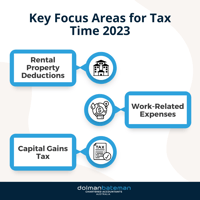The Australian Taxation Office (ATO) is stepping up its efforts to ensure rental property owners...
Get Your Rental Right this Tax Time: ATO's Crucial Reminders for Property Owners

The Australian Taxation Office (ATO) has issued a timely reminder to rental property owners to ensure their tax returns are filed accurately. A startling revelation from the ATO indicates that a significant portion of rental property owners, approximately 9 in 10, make errors in their tax returns related to rental income and deductions. This means that many landlords may be overclaiming expenses or claiming for improvements to their private properties incorrectly. The consequences of these errors not only affect individual taxpayers but also impact the broader Australian community by diverting funds that could otherwise support essential services such as education, healthcare, and sports.
Rental Income: Report All Sources
One crucial aspect of filing your tax return as a rental property owner is accurately reporting all rental income. This includes income from various sources, such as short-term rental arrangements, renting out a portion of your home, and other rental-related earnings, like insurance payouts and rental bond money retained. To ensure compliance, the reported income should align with your ownership interest in the property, generally reflecting the terms outlined in the legal documents.
It's essential to report rental income in the year it is received from tenants, not when it's transferred to you by your property manager. Also, report the gross amount received before deducting property manager fees and other expenses paid on your behalf.
A key piece of advice is not to double dip on your deductions. Some taxpayers mistakenly report their net rental income after their property manager has settled expenses and then attempt to claim deductions for items like rates and repairs again.
Rental Expenses: Understanding Categories
Rental expenses fall into three distinct categories:
- Expenses where deductions are not allowed: Personal expenses and capital expenses, including those related to the personal use of the property and capital assets, such as secondhand depreciating assets, are not deductible.
- Immediate deductions: Certain expenses, such as interest on loans, council rates, repairs, maintenance, and depreciating assets costing $300 or less, can be claimed as an immediate deduction in the income year they are incurred.
- Deductions over multiple years: Capital works, borrowing expenses, and the decline in value of depreciating assets can be claimed as deductions over a period of several income years, provided specific criteria are met.
Interest expenses, in particular, are under the ATO's scrutiny. It's crucial to correctly apportion loan interest expenses if part of the loan was used for private purposes or if you refinanced your loan for private reasons. Only the portion of interest directly related to earning rental income is deductible.
Repairs, Maintenance, and Improvements: Know the Difference
Understanding the distinction between repairs, maintenance, and improvements is vital for rental property owners. Initial repairs required to rectify damage, defects, or deterioration present at the time of purchasing a property cannot be claimed as an immediate deduction but may qualify for deductions over several years as capital works.
On the other hand, general repairs and maintenance performed on a rental property that you've owned for some time can be claimed as immediate deductions. However, if you undertake significant improvements, such as replacing an entire bathroom, these expenses are considered capital improvements and should be claimed over time as capital works.
Short-Term Rentals and Holiday Homes: Apportioning Deductions
Owners of short-term rental properties, such as holiday homes, need to carefully apportion their deductions when the property or a part of it is not used to generate rental income. This includes situations where the property is used personally or reserved for friends or family. Excessive restrictions on prospective tenants, like requiring references for short holiday stays or imposing conditions such as 'no children' in a family-friendly location, also necessitate careful documentation.
Ensure you maintain records that demonstrate your expenses related to the rental property and their direct relevance to generating rental income. If you offer discounted rates to acquaintances, your deductions can only equal the income you've received.
The ATO is particularly vigilant about errors in this area and encourages taxpayers to rectify genuine mistakes promptly, as deliberate overclaiming can lead to penalties.
Data Matching: Enhanced Accuracy through Technology
The ATO employs sophisticated data matching capabilities to enhance the accuracy of tax returns. Recent additions to their data-matching arsenal include Residential Investment Property Loans (RIPL) and Landlord Insurance (LI) data matching programs. These initiatives provide the ATO with valuable insights to verify the correctness of income and deduction reporting.
The ATO's data-matching efforts encompass property management, rental bond, and property transaction data, allowing them to address various taxation risks in the investment property market. Given the prevalence of tax agents in assisting taxpayers, it's vital for property owners to provide their tax agents with accurate information and for tax agents to ask pertinent questions to ensure compliance. This blog has been prepared for the purposes of general information and guidance only. It should not be used for specific advice or used for formulating decisions under any circumstances. If you would like specific advice about your own personal circumstances, please feel free to contact us on 02 9411 5422. We can help make sure the right method is used to give you the maximum possible tax deduction associated with any of these methods.
This blog has been prepared for the purposes of general information and guidance only. It should not be used for specific advice or used for formulating decisions under any circumstances. If you would like specific advice about your own personal circumstances, please feel free to contact us on 02 9411 5422. We can help make sure the right method is used to give you the maximum possible tax deduction associated with any of these methods.



